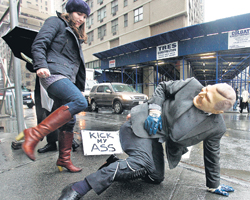
Bush’s coalition of the willing crumblingNEW YORK - The Bush administration's inept foreign policy — long characterized by political arrogance and dubious double standards — took a severe beating last week. The Brits say they have decided to trim their forces in Iraq while the Danes and the Lithuanians have announced plans to withdraw all of their token troops from the military inferno in Iraq. On the UN front, the Iranians have thumbed their noses at Washington by defying a US-sponsored Security Council resolution to halt nuclear enrichment on a given deadline.
And there was more bad news last week as the Italian coalition government collapsed over a US-pressured decision to provide troops to Afghanistan, and also strong resentment to a proposed plan to expand an American military base in northern Italy. Meanwhile, the Russians threatened to attack two American allies, Poland and the Czech Republic, if the US decides to base missiles defences in the two former Eastern European nations. And there is also trouble brewing over international aid to Palestine. The 27-member European Union and Russia were willing to provide assistance to a coalition Palestinian government despite the unwillingness of Hamas to recogize the state of Israel or renounce violence. The US, which has always insisted that recognition of Israel was mandatory for any aid to a Hamas-run administration in the occupied territories, was moving towards splendid isolation as a new political crisis developed in the Middle East. Even the much-ballyooed nuclear deal with North Korea — which triggered a firestorm of criticism among right-wing Republicans of the Bush administration — is being viewed as a sell-out to Pyongyang. The rash of US foreign policy failures coincides with the growing unpopularity of the Bush administration, as reflected in several recent nation-wide opinion polls. With the House of Representatives and the Senate at loggerheads over Iraq, there is likely to be a constitutional crisis as the majority of members in the US Congress are challenging Bush's authority to send more troops to Iraq and prolong a war the US just cannot win. However, the biggest blow last week came from British Prime Minister Tony Blair, an ever-faithful ally of the Bush administration, who told the House of Commons that Britain would withdraw almost a quarter of its 7,100 troops, mostly based in Basra. After the US (139,000 troops), Britain was the second largest provider of troops, just ahead of South Korea (2,300). Britain's decision to begin withdrawal comes at a time when the Bush administration is sending an additional 21,500 troops to Iraq, a move that has generated strong opposition from the House of Representatives and from Republican politicians, including Senators. Not surprisingly, both Bush and Blair have put a positive spin on the pullout pointing out that the withdrawal signifies stability in Basra — an argument so naive that it lacks any credibility. As the Financial Times put it last week: "If Mr Blair is trying to rescue his legacy, one way is to take a cold look at the destructive policies in the Middle East of his friend George W. Bush." The infamous "coalition of the willing" — an international force which also included token troops from countries such as Estonia (35), Kazakhstan (27), the Netherlands (15) and Slovenia (4) — was on the verge of unravelling even as Iraq was turning out to be a military quagmire for the Americans. The reality was that the military "coalition" in Iraq was a widely-known hoax giving the US-UK military occupation an international facade. But that facade is in danger of collapsing. Besides Britain's pullout (up to 1,600 out of 7,100 troops), the Danes have decided to withdraw all of their 460 soldiers (under British command) by August while Lithuania has announced plans to pull out its tiny contingent of 53 troops. John Warner, a Senator from Bush's Republican Party who opposes the "surge" in US troops and has expressed concern about the British troop withdrawal, said last week: "What I'm worried about is that the American public will be quite perplexed by the president adding forces while our principal ally is subtracting forces." Meanwhile, there were dangers of a revival of the old US-Soviet Cold War as Russian President Vladimir Putin lashed out at the Bush administration for its failed unilateral policies making the world a more dangerous place. Addressing a meeting in Europe two weeks ago, Putin said Washington had repeatedly overstepped its national borders on questions of international security, and thereby made the world less safe. "Unilateral actions have not resolved conflicts but have made them worse," Putin said. "This is very dangerous. Nobody feels secure any more because nobody can hide behind international law," he added. Criticising the so-called "unipolar" world currently dominated by the US, he asked: "What is a unipolar world? No matter how we beautify this term it means one single centre of power, one single centre of force, and one single master." Taking a shot at US policy aimed at spreading democracy in the Middle East and the rest of the world, Putin said: "People are always teaching us democracy, but the people who teach us democracy don't want to learn it themselves." |
|| Front
Page | News | Editorial | Columns | Sports | Plus | Financial
Times | International | Mirror | TV
Times | Funday
Times || |
| |
Copyright
2007 Wijeya
Newspapers Ltd.Colombo. Sri Lanka. |
